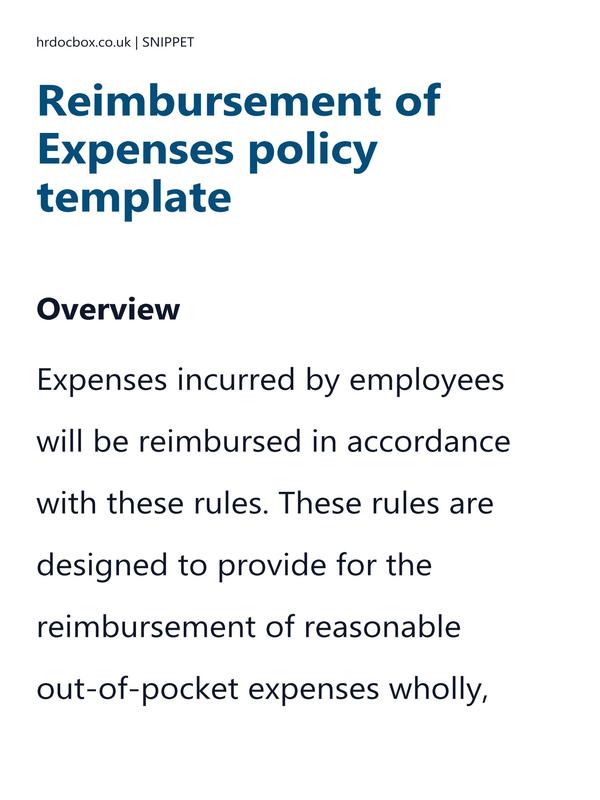Expenses policy templates
Our Expenses Policy Templates streamline expense management, providing clear guidelines for employees to submit accurate and timely expense claims.
If you need policies to communicate your company rules and support regarding expenses, these policy templates provide an effective legal framework.
- Includes 12 months' access to 4 Expenses templates, with all updates to the Expenses policy templates provided free of charge and notified to you.
- UK-specific accuracy.
- Instantly download templates as Word / PDF / plain text, or send by email.
- These Expenses policy templates will SAVE you up to 3 hours drafting & research, save you money, and reduce your risk.
Expenses
Expense policies are a set of guidelines and rules that govern how employees can spend money on behalf of a company. These policies define what expenses are considered valid, how expenses should be documented and reimbursed, and what limits and restrictions apply to various types of expenses.
Some common elements of an expense policy might include:
-
Approval process: who has the authority to approve expenses and what criteria must be met before an expense is approved.
-
Expense types: which types of expenses are eligible for reimbursement, such as travel expenses, meals, lodging, and office supplies.
-
Maximum limits: how much an employee can spend on each type of expense, and what the overall limit is for expenses within a given time period.
-
Documentation requirements: what receipts and other documentation are required to substantiate each expense, and what format they should be in.
-
Reimbursement procedures: how expenses should be submitted for reimbursement, how long it will take to receive reimbursement, and what forms of payment are available.
Having clear and comprehensive expense policies helps to ensure that employees are spending company funds responsibly and in accordance with company goals and values. It also helps to prevent fraud, waste, and abuse of company resources.
Expenses templates are essential for clearly defining company policies and setting consistent employee expectations around Expenses arrangements.
Compliance
Compliance
Here are some key UK employment legislation considerations to keep in mind when implementing expenses policies:
-
The Equality Act 2010: This legislation prohibits discrimination on the basis of protected characteristics such as age, disability, gender reassignment, race, religion or belief, sex, and sexual orientation. When developing expenses policies, it's important to ensure that they do not discriminate against any particular group of employees or disadvantage individuals with protected characteristics.
-
The Income Tax (Earnings and Pensions) Act 2003: This legislation sets out the rules around expenses and benefits in relation to tax. Employers must ensure that their expenses policies comply with these rules and do not result in tax liabilities for themselves or their employees.
-
The National Minimum Wage Act 1998: This legislation sets out the minimum wage rates that employers must pay their employees. Employers must ensure that their expenses policies do not result in employees being paid less than the minimum wage.
-
The Working Time Regulations 1998: This legislation sets out the maximum number of working hours per week, as well as minimum rest breaks and holidays for most workers. Employers must ensure that their expenses policies do not require employees to work longer hours than is legally allowed.
-
The Data Protection Act 2018: This legislation sets out the requirements for the collection, use, and storage of personal data. Employers must ensure that any data collected as part of expense management is done in compliance with this legislation.
-
The Employment Rights Act 1996: This legislation sets out various employee rights, including the right to receive pay and protection against unfair deductions from pay. Employers should ensure that their expenses policies comply with these rights and do not result in employees being paid less than they are entitled to.
-
The Companies Act 2006: This legislation sets out the requirements for company reporting and disclosure. Employers must ensure that their expenses policies comply with these requirements and that they have adequate controls in place to prevent fraud or misuse of company funds.
Frequently Asked Questions about Expenses templates
Frequently Asked Questions about Expenses templates
-
Can small businesses use these Expenses policy templates?
Yes. The Expenses policy templates are designed to be flexible and suitable for organisations of all sizes, including small businesses and charities. They follow UK employment law best practice, so even if you don't have an in-house HR team, you can confidently manage Expenses processes and issues.
-
Are these Expenses policy templates up to date for UK law in 2026?
Absolutely. All templates are drafted with the latest ACAS guidance and UK employment legislation in mind. We review and update them regularly, so you can be confident they remain compliant.
-
What types of Expenses policies are included?
Every toolkit includes a complete set of editable policy templates, designed to save time and ensure compliance.
-
How will this help me as an HR manager or business owner?
Purchasing the policies saves you hours of drafting time and reduces the risk of legal mistakes. Instead of starting from scratch, you'll have clear, professional policy templates that you can adapt to your business.
-
Do I get instant access to the policy templates?
Yes. Once purchased, you'll be able to download the Expenses policies instantly. The templates are provided in editable Word or Excel format so you can customise them easily, and PDF format for easy sharing.
-
Can I preview a sample Expenses template before buying?
We provide free examples of our templates here. This gives you a sense of the quality and layout before you commit to purchasing the full toolkit.
-
What if I need a full HR toolkit, not just Expenses templates?
If you're looking for broader support, we also offer library bundles that include Expenses templates along with absence, grievance, and other HR policies. These may be more cost-effective if you need a complete HR library.
-
Why should I use these templates, and not AI to generate them?
The risk of using free AI-generated templates 'without review' includes your legal exposure, missing context, and no awareness of the wider process. Purchasing from us mitigates that risk.


